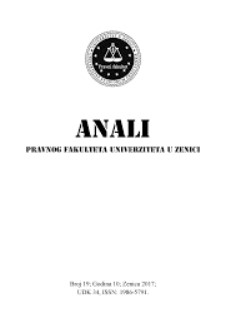SUPROTSTAVLJANJE I SIMBIOZA RASPRAVNOG NAČELA I NAČELA SLOBODNE OCJENE DOKAZA U PARNIČNOM POSTUPKU
OPPOSITION AND SYMBIOSIS OF THE PRINCIPLE OF PARTY CONTROL OF FACTS AND MEANS OF PROOF AND THE PRINCIPLE OF FREE EVALUATION OF EVIDENCE IN LITIGATION
Author(s): Adis PoljićSubject(s): Law, Constitution, Jurisprudence, Methodology and research technology, Court case
Published by: Pravni fakultet - Univerzitet u Zenici
Keywords: adversarial principle; principle of party control of facts and means of proof; facts; evidence; formal truth;
Summary/Abstract: The subject of the paper are two principles related to the procedural material, the principle of party control of facts and means of proof and the principle of free evaluation of evidence. The aim of the research is to indicate how the court is obliged to act in order to properly carry out the concentration process, establish evidence and establish legally relevant facts. It is a complex court procedure that requires a lot of knowledge due to the intertwining of these principles, which results in their opposition and symbiosis. The aim of the research was achieved by applying primarily the normative method by which positive law in Bosnia and Herzegovina was studied and examined. In addition to this method, the historical method was used in the study of previous legal solutions, the method of synthesis on the basis of which the basics of the subject principles were indicated in order to understand their nature and the deductive method on the basis of which the research was started. principle and the principle of free evaluation of evidence. Based on the research, it was found that there is a contradiction of the subject principles in the possibility of asking questions to remedy the deficit of the claim, while symbiosis exists in clarifying the facts and proposed evidence, the possibility of the party’s statement on the opponent’s claims and asking questions to remedy the deficit of evidence. A violation of the principle of free evaluation of evidence, as well as the principle of party control of facts and means of proof, occurs when the court did not limit itself to the circumstances to which the evidence was proposed during the evaluation of evidence. The principle of party control of facts and means of proof limits the principle the principle of free evaluation of evidence in the evidence to be adduced, and in the evaluation of evidence. The ultimate consequence of the simultaneous application of principle of party control of facts and means of proof, and the principle of free evaluation of evidence is the formal truth in litigation.
Journal: Anali Pravnog fakulteta Univerziteta u Zenici
- Issue Year: 14/2021
- Issue No: 27
- Page Range: 143-162
- Page Count: 20
- Language: Bosnian

